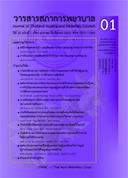Predictive Factors for Systemic Inflammatory Response in Trauma Patients
Keywords:
age, comorbidity, substance use, trauma, MEWS, SIRSAbstract
Abstract:
Objective: To study the predictive power of age, comorbidity, substance use, and severity of physiological change on trauma patients’ systemic inflammatory response syndrome.
Design: Descriptive predictive study.
Methodology: The sample consisted of 147 conscious trauma patients admitted to hospital within 24 to 72 hours after injury, with 15 points on the Glasgow Scale. Data gathering instruments were a demographic data form, a comorbidity evaluation form, a substance use evaluation form, the Modifed Early Warning Score (MEWS), and the Systemic Inflammatory Response Syndrome (SIRS) form. The data were analysed using
binary logistic regression, with the level of signifcance set at .05.
Results: The majority of the participants were male (68.7%) aged averagely 46.95 years (SD = 19.59%), with those aged 18 to 40 forming the largest group (42.2%). Comorbidity and substance use were found in 36.7% and 57.1% of the participants, respectively. The most common comorbid condition was hypertension (18.4%), whilst the most commonly used substance was alcohol (47.6%). Most of the participants (79.6%) displayed mild degrees of MEWS. SIRS was detected in more than half (55.1%) of the participants, with mild SIRS being most common (42.9%). Based on the analysis, the factors of age, substance use, and MEWS were capable of signifcantly predicting incidence of SIRS in 31% of the trauma patients (Nagelkerke R2 = .31, p < .05), whereas the factor of comorbidity was not.
Recommendations: Nurses should perform SIRS evaluation on middle-aged and older patients, patients with a history of substance use, and patients with a moderate to severe degrees of MEWS, in the emergency department. This could quicken SIRS detection, reduce complications, and determine proper treatment processes for each patient.
Downloads
References
1. Binkowska AM, Michalak G, Słotwiński R. Current views on the mechanisms of immune responses to
trauma and infection. Centr Eur J Immunol 2015; 40(2):206-16.
2. Robertson CM, Coopersmith CM. The systemic inflammatory response syndrome. Microbes Infect 2006;8(5):1382-9.
3. Toft P, Tønnesen E. The systemic inflammatory response to anaesthesia and surgery. Current Anaesthesia & Critical Care 2008;19(5):349-53.
4. Lenz A, Franklin GA, Cheadle WG. Systemic inflammation after trauma. Injury 2007;38(12):1336-45.
5. Lord JM, Midwinter MJ, Chen Y-F, Belli A, Brohi K, Kovacs EJ, et al. The systemic immune response to trauma: an overview of pathophysiology and treatment. Lancet 2014;384(9952):1455-65.
6. Ringdal KG, Skaga NO, Steen PA, Hestnes M, Laake P, Jones JM, et al. Classifcation of comorbidity in
trauma: the reliability of pre-injury ASA physical status classifcation. Injury 2013;44(1):29-35.
7. Miller J, Edwards LD, Agustí A, Bakke P, Calverley PMA, Celli B, et al. Comorbidity, systemic inflammation and outcomes in the ECLIPSE cohort. RESP MED 2013;107(9):1376-84.
8. Humeniuk R, Ali R, Babor TF, Farrell M, Formigoni ML, Jittiwutikarn J, et al. Validation of the Alcohol,
Smoking And Substance Involvement Screening Test (ASSIST). Addiction 2008;103(6):1039-47.
9. NeSmith EG, Weinrich SP, Andrews JO, Medeiros RS, Hawkins ML, Weinrich MC, et al. Substance Use and the Systemic Inflammatory Response Syndrome (SIRS) Following Trauma. J Trauma Nurs 2011; 18(2):79-84.
10. Jiang X, Jiang P, Mao Y. Performance of Modifed Early Warning Score (MEWS) and Circulation, Respiration, Abdomen, Motor, and Speech (CRAMS) score in trauma severity and in-hospital mortality prediction in multiple trauma patients: a comparison study. PeerJ 2019;7:e7227.
11. Qin Q, Xia Y, Cao Y. Clinical study of a new modifed early warning system scoring system for rapidly evaluating shock in adults. J Crit Care 2017;37:50-5.
12. Butcher N, Balogh ZJ. The defnition of polytrauma: the need for international consensus. Injury
2009;40(4):12-22.
13. Burch VC, Tarr G, Morroni C. Modifed early warning score predicts the need for hospital admission and inhospital mortality. EMJ 2008;25(10):674-8.
14. Graham JE, Christian LM, Kiecolt-Glaser JK. Stress, age, and immune function: toward a lifespan
approach. J Behav Med 2006;29(4):389-400.
15. Aw D, Silva AB, Palmer DB. Immunosenescence: emerging challenges for an ageing population. IMMUNOLOGY 2007;120(4):435-46.
16. Valderas JM, Starfeld B, Sibbald B, Salisbury C, Roland M. Defning comorbidity: implications for
understanding health and health services. Ann Fam Med 2009;7(4):357-63.
17. Smith RM. Immunity, trauma and the elderly. Injury 2007;38(12):1401-4.
18. Loftis J, Huckans M. Substance use disorders: Psychoneuroimmunological mechanisms and new
targets for therapy. Pharmacol Ther 2013;139(2): 289-300.
19. Peltz ED, Moore EE, Eckels PC, Damle SS, Tsuruta Y, Johnson JL, et al. HMGB1 is markedly elevated
within 6 hours of mechanical trauma in humans. Shock 2009;32(1):17-22.
20. Chao A, Chou W-H, Chang C-J, Lin Y, Jr., Fan S-Z, Chao A-S. The admission systemic inflammatory
response syndrome predicts outcome in patients undergoing emergency surgery. Asian J Surg 2013; 36(3):99-103.
21. Subbe CP, Kruger M, Rutherford P, Gemmel L.Validation of a modifed Early Warning Score
in medical admissions. QJM 2001;94(10):521-6.
22. Bone RC, Balk RA, Cerra FB, Dellinger RP, Fein AM, Knaus WA, et al. Defnitions for sepsis and
organ failure and guidelines for the use of innovative therapies in sepsis. The ACCP/SCCM Consensus Conference Committee. American College of Chest Physicians/Society of Critical Care Medicine. Chest 1992;101(6):1644-55.
23. McDaniel DO, Rigney D, Olivier J, McDaniel KY, Brock M, Redmond P, et al. Trauma Induced Inflammation,
Sepsis and Ageing. Ageing Int 2014;39(3):243-58.
24. Feldman C, Anderson R. Cigarette smoking and mechanisms of susceptibility to infections of the
respiratory tract and other organ systems. J Infect 2013;67(3):169-84.
25. Yamamoto BK, Moszczynska A, Gudelsky GA. Amphetamine toxicities: classical and emerging mechanisms. Ann N Y Acad Sci 2010;1187:101-21.
26. Osamu Kitahara, Kei Nishiyama, Bunsei Yamamoto, Shigeaki Inoue, Inokuchi S. The prehospital quick
SOFA score is associated with in-hospital mortality in noninfected patients: A retrospective, crosssectional study. PLOS ONE 2018;13(8):1-11.
27. Boehme AK, Hays AN, Kicielinski KP, Arora K, Kapoor N, Lyerly MJ, et al. Systemic inflammatory
response syndrome and outcomes in intracerebral hemorrhage. Neurocrit Care 2016;25(1): 133-40.








